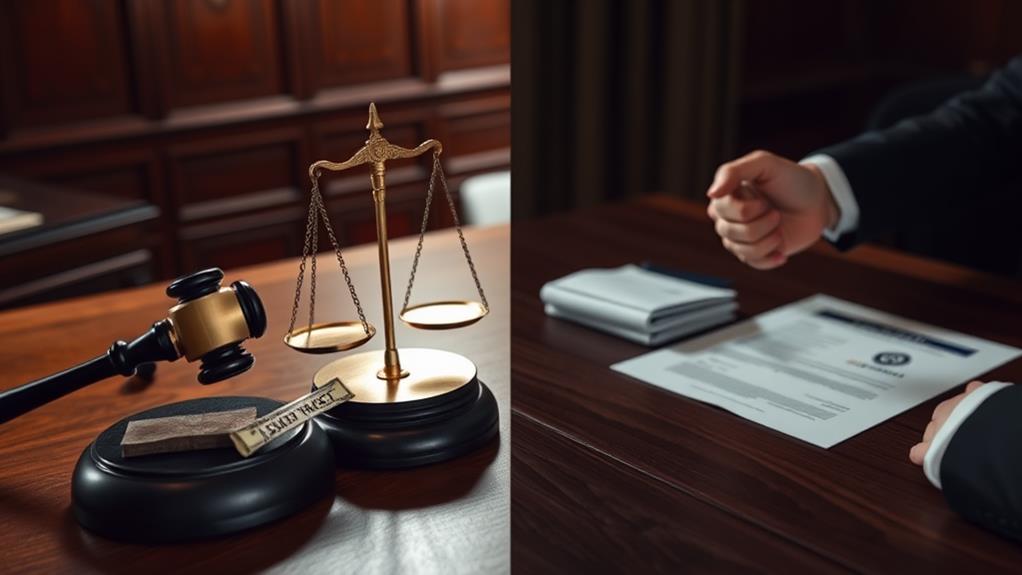When deciding between trial results and settlement offers in personal injury claims, each has its pros and cons. Trial results can lead to higher compensation and punitive damages, but they come with risks like unpredictability and delays. Trials also mean public court proceedings and possibly no compensation if you lose. On the other hand, settlement offers provide quicker, guaranteed financial relief and confidentiality, though they might offer less compensation and future costs coverage. Settlements are completed faster, often within six months, reducing stress and legal costs. Considerations will revolve around injury severity, financial needs, and legal guidance; staying informed helps define the best choice with confidence.
Understanding Trial Results

Trial results often hinge on how well evidence and arguments are presented to a judge or jury, leading to various outcomes depending on each case’s specifics. When a case proceeds to trial, the effectiveness of your legal team in showcasing the evidence can greatly influence the compensation awarded.
Trials usually offer the potential for higher compensation compared to settlement offers, particularly in cases involving severe injuries or clear negligence. This is because juries might award punitive damages, which aren’t typically part of settlements, thereby increasing the total compensation you could receive.
Understanding trial results means recognizing the multi-stage process involved, including jury selection, witness testimony, and deliberation, which can extend over weeks or even months. This complexity often deters many from pursuing trials, with only about 5% of personal injury cases making it to court.
However, the reward can be substantial. Your case’s strength and the presentation’s effectiveness determine whether the compensation awarded will offset the lengthy and often challenging trial process. By comprehending these dynamics, you can better weigh the potential outcomes and decide whether pursuing a trial aligns with your compensation expectations and personal circumstances.
Exploring Settlement Offers
While pursuing a trial can potentially result in higher compensation, many individuals opt for settlement offers due to their expediency and certainty. Settling outside of court means you avoid the lengthy and often unpredictable trial process. A settlement offer typically emerges from negotiations between you and the defendant or their insurance company. The aim is to agree on a monetary amount that reflects the compensation you deserve without going to trial.
However, be cautious, as the initial offer from insurance companies is often lower than what you might be entitled to. This requires negotiation to reach a fair settlement. With settlements, you gain quicker financial relief, as they can be finalized at any stage, even on the trial day. This is a significant advantage since waiting for a court verdict can be time-consuming and stressful.
Additionally, settlements provide closure. They prevent further claims for the same injury, offering certainty over a potentially prolonged legal battle. Approximately 95% of personal injury cases are resolved through settlement rather than trial. This statistic underscores how common this path is, making it a practical option for many seeking resolution.
Settling outside of court can guarantee you receive the compensation you deserve efficiently.
Advantages of Going to Trial

Opting for a trial can open up the potential for higher compensation compared to settlement offers. In a personal injury case, this is because juries often award larger sums, particularly for severe injuries. They consider pain and suffering, which mightn’t be fully accounted for in a settlement.
By choosing a trial, you allow your side to present its case in a thorough manner. This means you can cross-examine witnesses and submit evidence that strengthens your claim.
Trials also serve a broader purpose beyond individual compensation. They publicly hold defendants accountable, encouraging them to change their behavior and raising awareness about negligence in similar cases. This aspect of a trial can lead to societal benefits, as it highlights the importance of adhering to safety standards.
Moreover, trials can result in punitive damages, which are additional financial penalties meant to punish defendants and deter future misconduct. These damages aren’t typically part of settlement negotiations, offering you another financial incentive.
Benefits of Settling
Although pursuing a trial can offer certain advantages, settling a case has its own set of benefits that you might find appealing.
One significant advantage of a settlement agreement is the quicker resolution it offers. While trials can drag on for months or even years, settlements typically wrap up within three to six months. This means you can receive compensation for a personal injury much sooner, helping you address your financial needs without prolonged waiting.
Settling also incurs lower legal costs. You avoid the expenses associated with courtroom proceedings, such as expert witness fees and court costs, making it a more economical choice.
Additionally, a settlement provides a predictable outcome. By negotiating the compensation amount, both parties agree on the terms, reducing the uncertainty linked with jury verdicts. This predictability can offer peace of mind, knowing exactly what you’ll receive.
Privacy is another key benefit. Settlements help maintain confidentiality since the details of the agreement remain private, unlike trials which become public.
With approximately 32% of tort cases settling, it’s clear that reaching an out-of-court agreement is a practical option. Weighing these pros and cons, settling might be the right choice for you.
Risks of Trial Outcomes

Pursuing a trial comes with inherent risks that could greatly impact your case outcome. While the thought of a trial might seem appealing, it’s essential to understand the potential pitfalls that come with it.
The risks of trial outcomes can be significant, with unpredictable jury decisions that may result in lower compensation than expected. You might find yourself facing a financial burden, as legal fees, expert witnesses, and court expenses often add up to hundreds of thousands of dollars, sometimes exceeding the awarded amount.
- Unpredictable jury verdicts: Juries can award less than anticipated, or even nothing at all.
- High financial costs: Legal fees and court expenses can be substantial.
- Lengthy proceedings: Trials can stretch for months or years, delaying financial relief.
- Low trial likelihood: Only about 11% of personal injury cases go to trial, highlighting that most cases settle beforehand.
- Risk of no compensation: Losing at trial means potentially receiving nothing, while settlements guarantee a certain amount.
Engaging in settlement negotiations with an experienced personal injury attorney can help you weigh these risks and possibly secure a more predictable outcome, ensuring that you’re better equipped for the challenges ahead.
Drawbacks of Settlements
Settlements might seem like a straightforward solution, but they come with their own set of drawbacks that you should consider carefully. One significant issue is that settlements often provide lower compensation than what you might receive in a trial. Plaintiffs frequently accept initial settlement offers that don’t fully cover their damages, leaving them shortchanged.
This is especially concerning in an injury claim, where future medical costs could remain uncovered due to the finality of a settlement. Once you agree to a settlement, you can’t pursue additional claims for the same injury, which could be problematic if unforeseen expenses arise.
The negotiation process itself can be tough. Insurance companies often start with low offers, pressuring you to settle quickly. This pressure is compounded by time constraints many plaintiffs face, which can lead to hasty decisions and outcomes that don’t reflect the true value of your claim.
Additionally, settlements lack the formal judicial oversight present in trials, raising questions about the fairness and adequacy of the compensation offered. Without a court’s involvement, there’s no guarantee that the settlement will truly meet your needs, potentially leaving important aspects of your injury claim inadequately addressed.
Factors Affecting Decision

Several key factors can influence your decision to settle or proceed to trial. Understanding these can help you make an informed choice.
The severity of your injuries is a major consideration; more severe injuries might justify going to trial for potentially higher compensation. An experienced attorney can assess your case’s strength, guiding you on whether to settle or go to court based on evidence and legal arguments. Stronger cases often favor trial proceedings.
Immediate financial needs might also push you towards accepting a settlement. Settlements provide quicker compensation than the drawn-out trial process. However, weigh this against the potential for a larger award if you win in court.
The unpredictability of trial outcomes can also play a part. Some people prefer the certainty of a negotiated settlement, even if it means a lower offer, due to the risks involved with a trial.
Consider these factors:
- Severity of your injuries: The more severe, the higher the potential trial compensation.
- Strength of evidence: Strong evidence supports trial.
- Financial needs: Urgent needs might necessitate settlement.
- Trial unpredictability: Settlements offer certainty.
- Experienced attorney advice: Essential for informed decisions.
Evaluate these carefully to determine the best path for your situation.
Role of Legal Representation
In the domain of personal injury claims, having legal representation can greatly affect the outcome of your case. A personal injury lawyer brings valuable expertise in evaluating the true value of your claim, which is essential when weighing your decision to settle or go to trial. They can provide insights into potential settlement offers and trial results, helping you make informed decisions.
When it comes to settling a personal injury claim, a lawyer’s negotiation skills are indispensable. They can often secure higher settlement offers than you might achieve on your own. Their ability to gather and present compelling evidence plays a pivotal role in establishing liability, whether you’re considering a settlement or preparing for trial.
Moreover, an experienced personal injury lawyer understands the complexities of court proceedings, ensuring you’re well-prepared if settlement negotiations fall through. This preparation can be invaluable in a trial setting, where outcomes can be uncertain and stakes high.
Having legal guidance not only enhances your chances of a favorable outcome but also alleviates stress and confusion. With their support, you can confidently navigate the intricacies of trial results versus settlement offers, ultimately achieving the best resolution for your situation.
Conclusion
When deciding between trial results and settlement offers, remember that 95% of civil cases settle before reaching trial. Settlements can offer quicker resolutions and less stress, but they might not provide the satisfaction or compensation you seek. Trials, while risky, can result in higher awards or the opportunity to set a legal precedent. Weighing these options carefully, with guidance from legal representation, guarantees you make the best choice based on your unique circumstances and priorities.


Leave a Reply